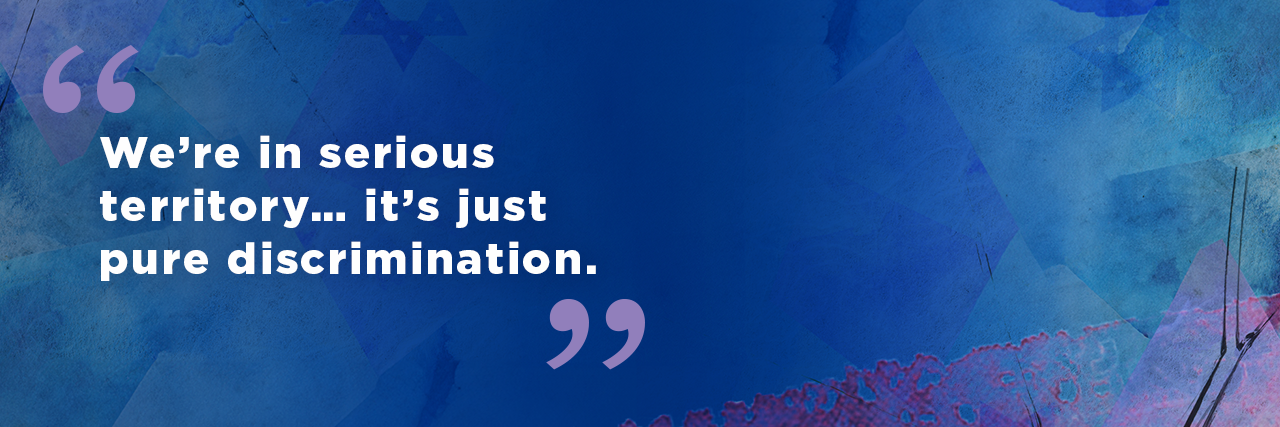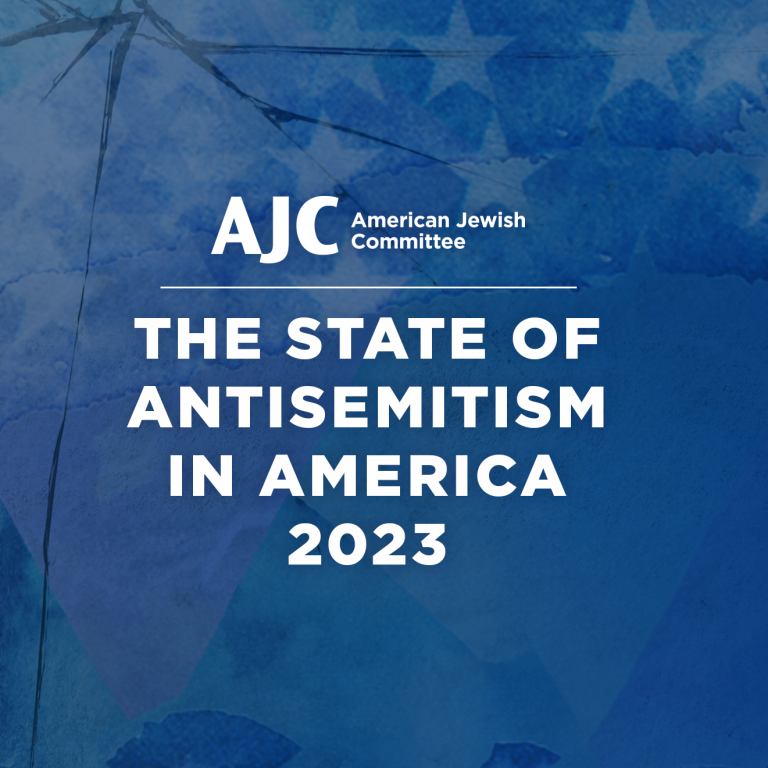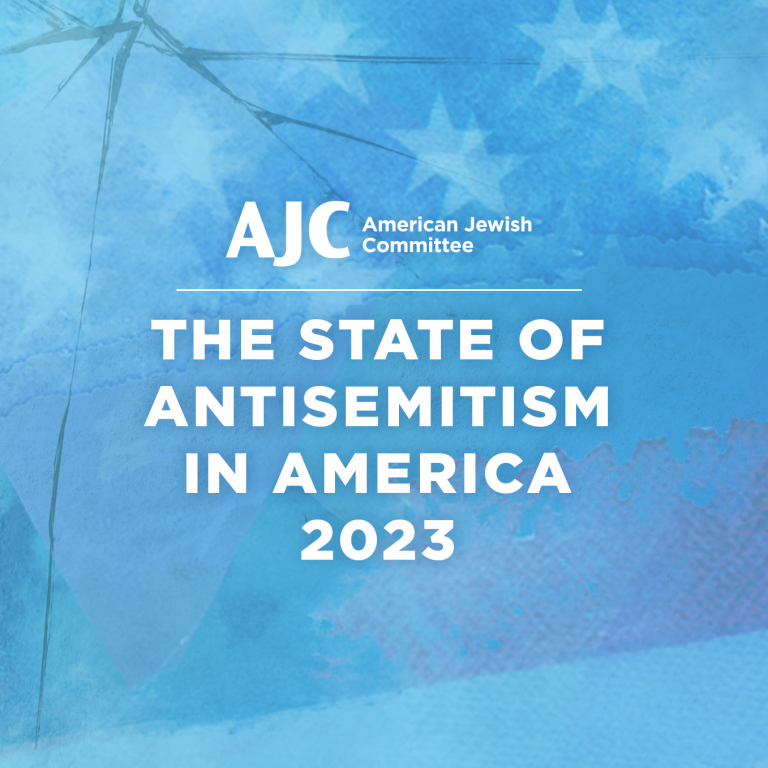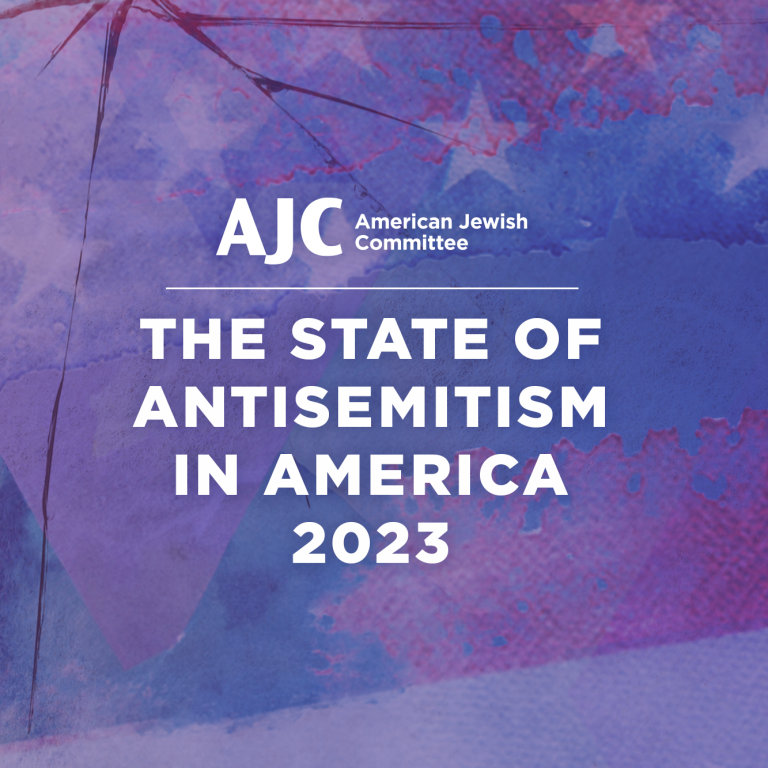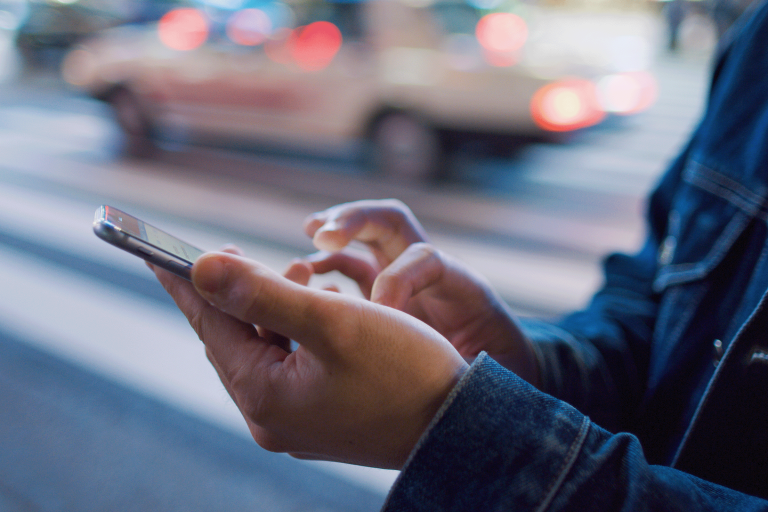February 13, 2024
A majority of American Jews believe antisemitism has become a “very serious” problem in the U.S. and young American Jews seem to bear the brunt of it. According to the latest annual State of Antisemitism in America Report released by American Jewish Committee (AJC) on February 13, 2024, 36% of young American Jews (between the ages of 18 and 29) reported being the personal target of antisemitism. That included antisemitic remarks in person, antisemitic vandalism or messaging on their property, or a physical attack.
“It’s always been our reality,” one Jewish business owner said. “People just have the license now to express these feelings.”
Meanwhile, online and on social media continue to be the place where American Jews experience antisemitism the most. Of the 62% who reported seeing or hearing antisemitism online or on social media in the past 12 months, more than one in five (22%) felt physically threatened by the post.=
Here are four stories that illustrate some of this year’s troubling findings.
‘They never took it seriously’
86% of American Jews and 75% of U.S. adults said state and local governments should include contemporary antisemitism in public school curricula.
The young dancer in Delaware was overjoyed when she successfully auditioned to get into her dream school. But at the end of her 8th-grade year, she was sitting alone in the cafeteria when a paper airplane hit her knee. She unfolded it to find “Blood of the Jews” scrawled amid splotches of red ink and swastikas. What she didn’t see was captured on video several minutes later when a couple of boys stood up and did a Heil Hitler salute. The harassment continued in the ensuing days and weeks as swastikas started to appear carved into the student's desk.
Her mother met with school administrators, but they didn’t see more than a few teenagers using “abusive language.”
Tara Jones, an ombudsman from the state’s Parent Information Center, helped the family file a federal complaint with the U.S. Department of Education’s Office of Civil Rights since the administrators would not acknowledge the antisemitic bullying and respond appropriately. An investigation turned up video footage that revealed the Heil Hitler salute, which the school had ignored.
The Office of Civil Rights also found that the student continued to experience a hostile environment in school until the end of the year. The public school district was ordered to fix its policies, send staff to anti-harassment training, and compensate the family for counseling. The Office of Civil Rights will continue to monitor the school district over the next year.
“The superintendent never personally contacted us,” said the student's mother, who kept 26 pages of notes throughout the time her daughter was being bullied, which the ombudsman included in the complaint. “They never took it seriously. I want to protect her and feel that people should know you need to stand up and fight against antisemitism.”
‘The police didn’t seem to care’
One in four (26%) American Jews with a current or recent connection to a college campus (as a parent or student) said they avoided expressing views on Israel on campus or with classmates out of fear of antisemitism. 25% have avoided wearing, carrying, or displaying things that would identify them as Jewish. 24% said they felt uncomfortable or unsafe at a campus event because they are Jewish.
Joseph, 18, wasn’t oblivious or naïve about antisemitism when he headed to college last fall. His Los Angeles public high school had been defaced with swastikas multiple times, and a teacher had commended rapper Kanye West, now known as Ye, for praising Hitler.
But that didn’t discourage Joseph from showing his Jewish pride a week after the Hamas terror attacks. When University of California, Berkeley students gathered on campus to praise Hamas, he went to watch, carrying his Israeli flag with him. When counter-protesters started to assemble nearby, he wrapped himself in the flag and walked in their direction.
“It was just a 100-foot walk. I wasn’t just going to crumple it up and walk over,” he recalled. “Some people going to and from the demonstration gave me dirty looks. Some gave me thumbs up.”
Suddenly, two people with their faces covered approached him and tried to tear the flag off his body. He wrestled to hold on to it, and his attackers stomped away spewing profanity. A bystander filmed the confrontation.
Joseph immediately approached university police and pointed out the perpetrators. Despite their proximity and the video footage to back up what happened, police let the perpetrators walk away.
According to AJC’s survey, 65% of American Jews said law enforcement is effective in responding to the security needs of Jews.
“The police didn’t seem to care very much,” Joseph said. “They said they couldn’t do anything, or they would incite a riot.”
Later that same day, another Jewish student at Berkeley was hit in the head with a water bottle. Since then, Jewish students on campus have filmed several public protests to chronicle what’s happening. Meanwhile, no university statement has mentioned assaults on Jewish students, and police have not pursued his case or any other.
“For me, I'm not upset about a personal attack,” Joseph said. “I feel more disappointed that when Jewish students get assaulted, the university administration can’t even issue a statement about that.”
‘It’s just pure discrimination’
One in five (19%) American Jews reported local businesses where they live have been the target of antisemitism in the past five years.
It doesn’t matter that she’s only 38. In South Philadelphia, pastry chef Tova du Plessis is everyone’s bubbe. Her challah, babka, and sandwiches seasoned with za’atar have made her tiny Essen Bakery a neighborhood favorite.
But for a pro-Palestinian group that in October called for a boycott of three dozen bakeries, restaurants, and markets that are “owned by Zionists,” it mattered that du Plessis is Jewish.
“That was really unsettling to know there are people thinking these things of you, discriminating against you for being Jewish, for recognizing that Israel is a country that has a right to exist,” said du Plessis, who posted her thoughts on Instagram with the image of an Israeli flag two days after the Hamas terror attacks. “It continues to be unsettling. It’s just our reality today. It’s always been our reality. People just have the license now to express these feelings.”
But targeting small businesses and Jewish business owners who are trying to make a positive impact in their communities takes rising antisemitism to a new level, du Plessis said.
“That’s when you know we’re in serious territory,” she said. “Beyond any kind of political activism, it’s just pure discrimination.”
‘Am I at risk as a person?’
One in four (26%) American Jews with a current or recent connection to a college campus (as a parent or student) said they avoided expressing their views on Israel because of fears of antisemitism.
As a law student, Eli knows that seeking justice occasionally requires making people feel uncomfortable.
But when some of his classmates stood up during a civil procedure class, proclaiming their disgust with U.S. support for Israel and chanting, “From the River to the Sea, Palestine will be free,” it didn’t make him feel uncomfortable. It made him feel unsafe. The common call-to-arms for pro-Palestinian activists refers to the establishment of a state of Palestine from the Jordan River to the Mediterranean Sea, erasing the state of Israel and its people.
“It was traumatic for many of us and disruptive to the learning experience,” said the Philadelphia law student. “Especially considering that we had to return to class with these same people who just called for what some of us viewed as the killing of our relatives.”
After meetings with deans and professors, some student activists confessed to not knowing what the chant meant. Meanwhile, some of the faculty told the Jewish students that it was necessary to “contextualize” the incidents of antisemitism they encountered.
But Eli doesn’t think context will make him feel any safer.
“It feels as though there is an unequal environment for expression,” he said. “As Jewish students, we are learning what we can and cannot do, ways we can not express ourselves. We ask ourselves, ‘Am I comfortable expressing this opinion in a public way, or am I at risk as a person?’”
